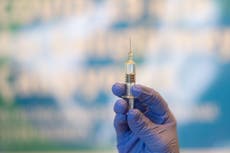Canada could donate Covid vaccine to poorer countries
Country could have as many as 414 million doses

Canada is discussing plans to donate Covid-19 vaccines to lower-income nations, inside sources have said.
This comes after the country has ordered the highest number of doses per capita in the world, according to the Duke Global Health Innovation Center in the US.
Ottawa has so far struck deals with seven different suppliers, meaning it could have as many as 414 million Covid-19 doses for its population of around 38 million.
However, the total number will depend on how many of these seven vaccines gain regulatory approval.
Two of the vaccines Canada has agreed to buy are from the pharmaceutical companies Pfizer and Moderna, both of which have delivered encouraging interim test results.
If Canada does end up with excess Covid-19 vaccines, it is “not going to allow those doses to go to waste”, one source said.
These shots could be donated to poorer countries via the World Health Organization’s COVAX facility, a mechanism attempting to provide equitable access to coronavirus vaccines across the world, said another.
A separate source confirmed to Reuters that the Canadian government was among those currently in discussions with the facility.
When asked about the possibility of sharing leftover medicine with other countries, the Canadian deputy procurement minister Bill Matthews said on Monday that it was “too early” to make a plan.
Even if vaccines are given regulatory approval soon, it is unclear when global vaccine supply could meet demand. One recent study from the Center for Global Development estimated that this might not happen until September 2023.
Additional reporting from Reuters
Join our commenting forum
Join thought-provoking conversations, follow other Independent readers and see their replies
Comments


Bookmark popover
Removed from bookmarks